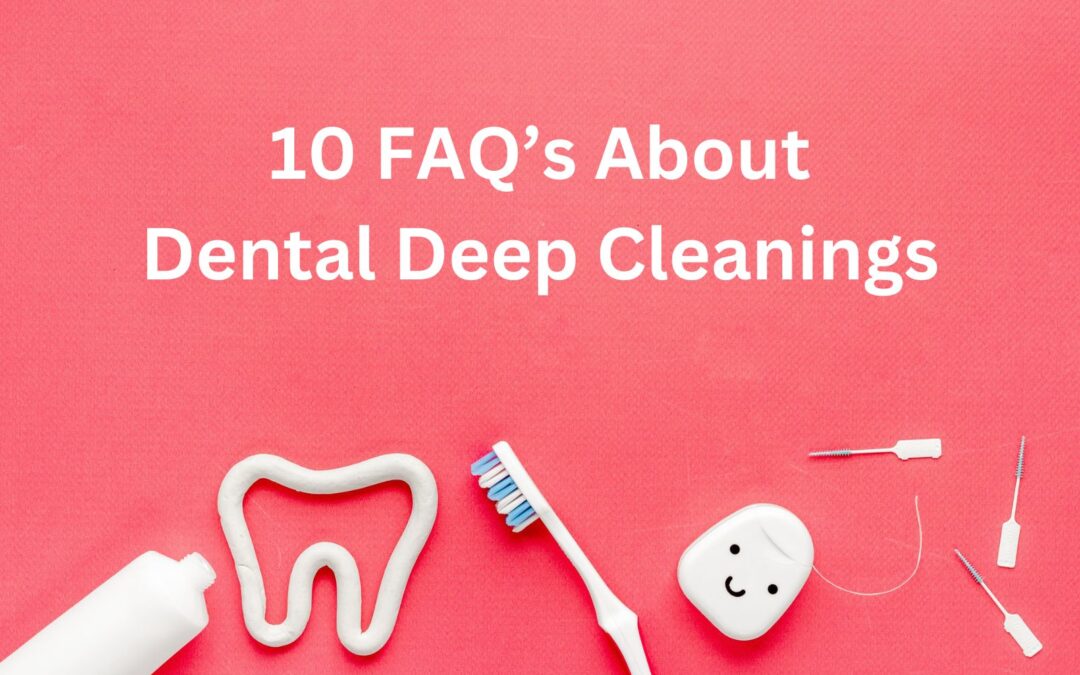Here are some of the most common Dental Deep Cleaning FAQs that our top Chicago dentists get asked.
Dental deep cleanings, also known as scaling and root planing, are essential dental procedures to treat gum disease and maintain optimal oral health. If you’ve been advised to get a deep cleaning or are curious about what it entails, this FAQ will help answer some of your most pressing questions.
1. What is a dental deep cleaning?
A dental deep cleaning, also known as scaling and root planing, is a non-surgical procedure performed by a dentist or dental hygienist. It involves thoroughly removing plaque, tartar (hardened plaque), and bacteria from the surfaces of your teeth and below the gumline. This is followed by smoothing the tooth roots to prevent future plaque buildup.
2. Why would I need a dental deep cleaning?
This procedure is typically recommended when there is a significant buildup of plaque and tartar, pockets forming between your teeth and gums, and signs of inflammation and infection.
3. What are the signs and symptoms of gum disease?
If you notice any of the following persistent symptoms: bleeding gums, persistent bad breath, swollen or tender gums, receding gums, and loose teeth, it’s essential to see one of our top Chicago dentists for an evaluation.
4. Is a deep cleaning painful?
Local anesthesia is often used to numb the treated area, which minimizes discomfort. You may feel some pressure or sensitivity during the procedure, but the goal is to keep you as comfortable as possible.
5. How long does a dental deep cleaning take?
The duration of a dental deep cleaning can depend on the number of teeth involved and the severity of the periodontal disease. On average, a full-mouth deep cleaning may take one to two hours. When one of our top Chicago dentists recommends a deep cleaning, they will let you know how long the cleaning will take based on your specific situation.
6. What is the recovery like after a deep cleaning?
Recovery from a deep cleaning is typically quick and straightforward. You may experience mild discomfort, sensitivity, or swelling for a few days. Our dentists will guide you on post-cleaning strategies to manage pain or swelling, typically including over-the-counter pain relievers and a soft diet. They’ll also provide post-operative care instructions to help you maintain good oral hygiene during healing.
7. How often do I need a dental deep cleaning?
The frequency of deep cleanings depends on your individual needs. Some people may only need one deep cleaning in their lifetime, while others with chronic gum disease may require it more frequently. One of our Chicago dentists will determine the appropriate schedule based on your oral health.
8. Can I prevent gum disease without a deep cleaning?
Regular dental check-ups and good daily oral hygiene habits, such as brushing, flossing, and using mouthwash, help prevent gum disease. However, in cases of advanced gum disease, a deep cleaning may be necessary to remove built-up plaque and tartar that cannot be eliminated with regular home care alone.
9. Is a dental deep cleaning covered by insurance?
Dental insurance plans vary. Our Chicago dental office offers a complimentary benefits check before your procedure. In many cases, dental deep cleanings are at least partially covered, especially if they are deemed medically necessary due to gum disease.
10. Can I request a dental deep cleaning if I haven’t been diagnosed with gum disease?
If you’re concerned about your oral health or suspect gum disease, it’s best to consult with one of our top Chicago dentists for a proper evaluation. They will recommend the appropriate treatment, including a deep cleaning if necessary. Requesting this procedure without a professional assessment is not advisable, as it should be based on your specific oral health needs.
Dental deep cleanings are essential for managing gum disease and maintaining good oral health. If you have any concerns about your dental health or are recommended to have a deep cleaning, don’t hesitate to contact our dental office for more information and personalized guidance. We offer a FREE SECOND OPINION, and one of our dentists can provide the best advice and treatment plan tailored to your unique situation. Schedule a consultation online or by phone (773-481-2200)

